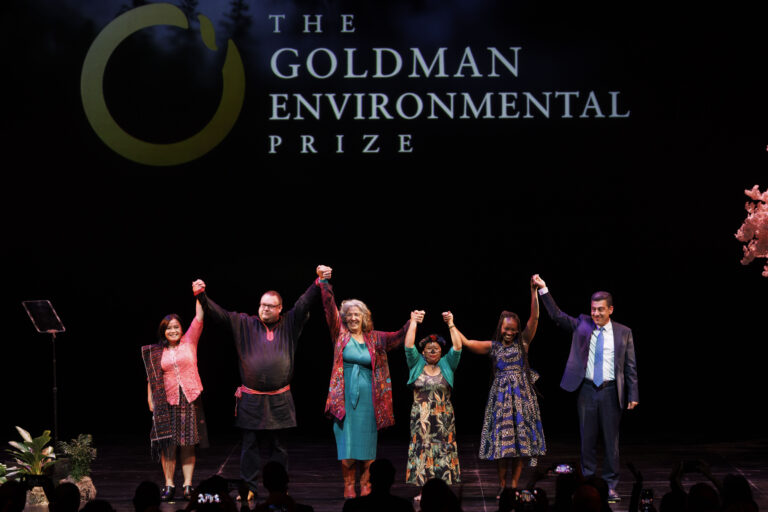The 2023 Goldman Prize Winners Symbolize Hope for Our Future
By: Lori Harrison

In many cultures across the world a rainbow symbolizes hope. For The John F. Kennedy Center for the Performing Arts, where I was headed for the second of two 2023 Goldman Environmental Prize award ceremonies, rainbows are synonymous with The Kennedy Center Honors and symbolize “a spectrum of many skills within the performing arts.” As I made my way into Washington, D.C. over the Potomac River, I smiled at the serendipity of seeing a perfectly formed rainbow over the Lincoln Memorial and Washington Monument.
That fleeting moment took on a deeper meaning as I sat with hundreds of guests in The Kennedy Center’s Eisenhower Theater and listened to our evening’s host, Pulitzer Prize-winning journalist and best-selling author Mary Jordan introduce the recipients we were there to celebrate. Six ordinary people from every inhabitable continent who have made an extraordinary impact, often at great personal risk, to protect our environment, Indigenous rights, and ultimately all life on Earth.
As a correspondent for the Washington Post, Jordan has written from more than 40 countries and has witnessed the destruction of our environment at the hands of profit-hungry corporations. She acknowledged that our world is suffering but the overwhelming feeling we shared last night wasn’t of fear or helplessness. It was of hope. Hope in what people achieve when they stand up and do what’s right.
People like Zafer Kizilkaya on the Turquoise Coast of Turkey (Asia) who worked to protect marine areas along 310 miles of the Mediterranean coast. Delima Silalahi from North Sumatra, Indonesia (Islands & Island Nations) who led a campaign to secure legal stewardship of nearly 18,000 acres of tropical forest land for six Indigenous communities for restoration as carbon sinks that help mitigate the impacts of climate change. Chilekwa Mumba from Chingola District in Zambia (Africa) who organized a lawsuit against the owner of a polluting copper mines operation and set a legal precedent in the UK Supreme Court. Alessandra Korap Munduruku of Sawré Muybu Indigenous Territory in Brazil (South & Central America) who organized community efforts to stop mining development by a British mining company in the Amazon rainforest. And Tero Mustonen from Selkie, Finland (Europe) who led the restoration of 86,000 acres of degraded former industrial peat mining and forestry sites into productive, biodiverse wetlands and habitats.
As part of a small contingent of staff, supporters, and local Waterkeepers groups in attendance, including Anacostia Riverkeeper, Gunpowder Riverkeeper, Potomac Riverkeeper Network, and Waterkeepers Chesapeake, I felt the sense of hope grow as each speaker and recipient took the stage. In addition to a welcome from David M. Rubenstein, Chairman of The John F. Kennedy Center for the Performing Arts and opening remarks from Susan R. Gelman, daughter of Goldman Prize founders Richard and Rhoda Goldman, Special Speaker Emerita Nancy Pelosi spoke of the importance of thinking globally and acting locally as well as acknowledged the symbolism of the diverse audience as a “United Nations of sorts.” People who traveled from different parts of the world to one place, for one purpose: to celebrate the collective impact of environmental activism.
Last to speak was the North American recipient, San Antonio Bay Estuarine Waterkeeper Diane Wilson who as “one of our own” is a valued and highly-respected member of our global water movement. Recognized for her landmark case against Formosa Plastics for illegal dumping of toxic plastic waste on Texas’ Gulf Coast, Diane secured a zero-discharge order against the polluting corporation and a historic $50 million settlement. As the largest financial settlement in the history of the U.S. Clean Water Act, the funds were used for research, outreach, and restoration of affected wetlands, beaches, and waterways.
For grassroots environmental leaders across the world, victories like these are hard won and often come with significant personal cost. Undeterred, Diane remains driven by a belief that if industry would stop at nothing then nothing would stop her. “They have tried to threaten me and they have tried to sue me. I didn’t stop, I persisted and the reason I persisted was because the bay was alive to me…I vowed that those companies would not get that bay.” Thanks to Diane, Formosa didn’t get it but she shared that “on this journey I’ve lost a lot of stuff. I lost my marriage. I lost my boat. I lost my job. I lost a bunch of friends. But the funny thing is, when you lose it all, you gain your soul.”
There will always be a price to pay when profit is prioritized over people and the planet. What sets Diane and her fellow awardees apart is that they decided that the consequence of complacency and inaction was worse than the consequence of standing strong against insurmountable odds.
Diane went on to say that “we are too well behaved and what we have to do is become unreasonable people for this earth!” Buoyed by the belief that “when you put your intention out there, and you take your body along for the ride, things happen,” she concluded by challenging everyone to do their part in protecting the only home we have.
“Your actions matter. I don’t care how small you think they are. All actions matter.”
I thought of Diane’s parting words as I crossed the Potomac River heading out of D.C. This time I smiled about an enduring symbol of hope that won’t fade with time: ordinary people who make an extraordinary impact and inspire us to do the same.